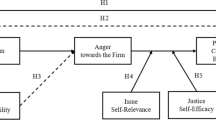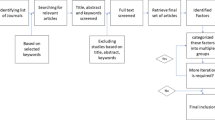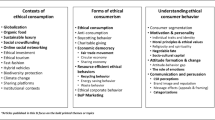Abstract
Sales professionals have been frequent targets of ethical criticism. This paper reports on a survey on ethics of sales professionals in South Africa. The results revealed salespeople’s views on controversial sales practices that involve direct monetary consequences; on practices that adversely affect customers, employers and competitors; and on sales peoples sensitization of ethical issues. Stealing from a competitor at a trade show was viewed as the most unethical of the scenarios, while phone sabotage and lying to a customer were held to be the next most unethical scenarios. Analysis of the results lead to a discussion of the implications for sales management. Ethical perceptions were affected by financial considerations. Marketing and Sales Managers will have to review their approach to training in sales ethics as well as how sales professionals implement the market driven approach.
Similar content being viewed by others
References
Aldridge, H. and D. Herker: 1997, ‘Boundary Spanning Roles and Organization Structure’, Academy of Management Review 2, 217-230.
Bellizzi, J. A.: 1995, ‘Committing and Supervising Unethical Sales Force Behaviour: The Effects of Victim Gender, Victim Status, and Sales Force Motivation Techniques’, Journal of Personal Selling and Sales Management 15, 1-15
Bush, V., S. Harris and A. Bush: 1997, ‘Establishing Ethical Boundaries for Service Providers: A Narrative Approach’, Journal of Service Marketing 11, 265-280.
Callan, V. J.: 1992, ‘Predicting Ethical Values and Training Needs in Ethics’, Journal of Business Ethics 11, 761-769.
Chonko, L. B. and J. J. Burnett: 1983, ‘Measuring the Importance of Ethical Situations as a Source of Role Conflict: A Survey of Sales People, Sales Managers and Support Personnel’, Journal of Personnel Selling and Sales Management 3, 41-47.
Chonko, L. B. and S. D. Hunt: 1985, ‘Ethics and Marketing Management: An Empirical Investigation’, Journal of Business Research 13, 339-359.
Dabholkar, P. A. and J. J. Kellaris: 1992, ‘Towards Understanding Marketing Students’ Ethical Judgement of Controversial Personal Selling Practices’, Journal of Business Research 24, 313-329.
Ferrell, O. C. and S. J. Skinner: 1988, ‘Ethical Behavior and Bureaucratic Structure in Marketing Research Organizations’, Journal of Marketing Research 25, 103-109.
Hofstede, G.: 1997, Cultures and Organizations; Software of the Mind (McGraw-Hill, New York).
Kellaris, J. J. and P. A. Dabholkar: 1989, ‘The PSE Scale: A Scenario Based Approach to Assessing the Ethical Sensitivity of Sales Students and Professionals’, in D. J. Good (ed.), Proceedings of the Pi Sigma Epsilon National Conference in Sales Management (Pi Sigma Epsilon, New Orleans, LA), pp. 32-37.
Levy, M. and A. J. Dubinsky: 1983, ‘Identifying and Addressing Retail Salespeople’s Ethical Problems: A Method and Application’, Journal of Retailing 59, 46-66.
McClaren, N.: 2000, ‘Ethics in Personal Selling and Sales Management: A Review of the Literature Focusing on Empirical Findings and Conceptual Foundations’, Journal of Business Ethics 27, 285-303.
McNichols, C. W. and T. W. Zimmerer: 1985, ‘Situational Ethics: An Empirical Study of Differentiators of Student Attitudes’, Journal of Business Ethics 4, 175-180.
Murphy, P. E. and G. R. Laczniak: 1981, ‘Marketing Ethics: A Review with Implications For Managers, Educators and Researchers’, in B. E. Enis and K. J. Roering (eds.), Review of Marketing (American Marketing Association, Chicago, IL).
Nantel, J. and W. A. Weeks: 1996, ‘Marketing Ethics: Is there More to it Than the Utilitarian Approach?’, European Journal of Marketing 30, 543-555.
Serwineck, P. J.: 1992, ‘Demographic and Related Differences in Ethical Views among Small Businesses’, Journal of Business Ethics 11, 555-566.
Stevenson, T. H. and C. D. Bodkin: 1988, ‘A Cross National Comparison of University Students’ Perceptions Regarding the Ethics and Acceptability of Sales Practices’, Journal of Business Ethics 17, 45-55.
Trompenaars, F.: 1993, Riding the Waves of Culture: Understanding Cultural Diversity in Business (Nicholas Brealey Publishing Ltd., London)
Vitell, S. J., K. Rallapalli and A. Singhapakdi: 1993, ‘Marketing Norms: The Influences of Personal Moral Philosophies and Organizational Ethical Culture’, Journal of the Academy of Marketing Science 21, 331-337.
Weeks, W. A. and J. Nantel: 1992, ‘Corporate Codes of Ethics and Sales Force Behavior: A Case Study’, Journal of Business Ethics 11, 753-760.
Zikmund, W.: 1984, Business Research Methods, 5th Edition (The Dryden Press, Orlando).
Author information
Authors and Affiliations
Rights and permissions
About this article
Cite this article
Abratt, R., Penman, N. Understanding Factors Affecting Salespeople’s Perceptions of Ethical Behavior in South Africa. Journal of Business Ethics 35, 269–280 (2002). https://doi.org/10.1023/A:1013872805967
Issue Date:
DOI: https://doi.org/10.1023/A:1013872805967




